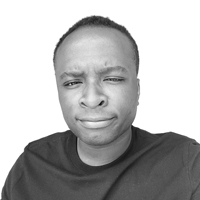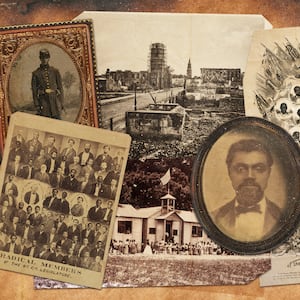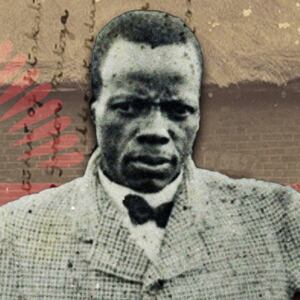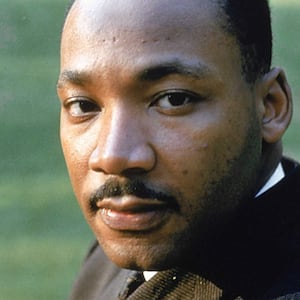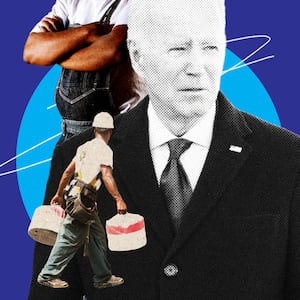For over a century and a half, the United States ignored the values its founding documents demanded, “that all men are created equal, that they are endowed by their Creator with certain unalienable Rights, that among these are Life, Liberty, and the pursuit of Happiness.”
As a standard bearer and fighter for justice, the Reverend Dr. Martin Luther King Jr. dedicated his life to waking up the conscience of the United States and making these founding principles a reality.
In the South, King was a pastor at Ebenezer Baptist Church. His fellow Black Americans lived under a set of principles instituted by the Jim Crow doctrine, a wretched and racially discriminatory caste system designed to dehumanize them. By mobilizing the young people of the nation, King and civil rights activists alike launched a second American revolution founded on love and nonviolence to resuscitate America’s heart.
On the federal holiday dedicated to MLK, it’s become customary to participate in a few hours of community service or volunteering to commemorate his life and legacy. For many, this has become King’s parting story. His larger-than-life existence as a globally celebrated political figure shows the power of his philosophy.
However, the 21st century translation of his work has repressed his core teachings. King’s critique of our political system, capitalism, and American militarism has been sanitized by a more palatable message of engaging in impactful volunteer work.
Community service and community-building were important parts of King’s ideas—he did, in fact, say, “everyone can be great because everyone can serve”— but service was not his whole ethos. King’s legacy calls on us to embark on a more challenging journey: cognizant citizenship and a revolution of American values.

Civil Rights leaders, including Dr. Martin Luther King Jr., holds hands as they march along the National Mall during the March on Washington for Jobs and Freedom, Washington DC, August 28, 1963.
PhotoQuest/Getty ImagesOn April 4, 1967, exactly one year before he died, King gave a controversial speech that made him practically a political pariah in his final year of life. The speech titled, “A Time to Break Silence,” laid out his perception of the United States internationally.
The main source of controversy in this speech was his aggressive rejection of the Vietnam War. His close advisers were concerned the speech would hurt the civil rights movement’s relationship with pro-war President Lyndon B. Johnson, the signer of the Voting Rights Act of 1965 and supporter of the Black freedom struggle.
Despite the realpolitik, King was undeterred, and while critiquing America’s involvement in the Vietnam War during the speech, he proclaimed, “I am convinced that if we are to get on the right side of the world revolution, we as a nation must undergo a radical revolution of values. When machines and computers, profit motives, and property rights, are considered more important than people, the giant triplets of racism, extreme materialism, and militarism are incapable of being conquered.”

Dr. Martin Luther King Jr. at the Riverside Church in New York City.
Bennett Raglin/WireImageThis speech, “A Time to Break Silence,” reflects the moral clarity King preached. He was cognizant of the thread of intersectionality between all injustices. King could have continued to advance the civil rights movement without bringing in the political complications of the Vietnam War. Many politicians during that time would have preferred for him to do that. Instead, King understood that in order to touch its founding values, America had to strive for equality and justice everywhere.
In his “Letter from Birmingham Jail,” King wrote, “injustice anywhere is a threat to justice everywhere.” Throughout his writings, King demonstrated a wholehearted commitment to cognizant citizenship.
A concept that also defines many of his other speeches is the thread between cognizant citizenship and democratic responsibility. In “A Time to Break Silence,” King calls “all ministers of draft age to give up their ministerial exemptions and seek status as conscientious objectors,” and that “every man of humane convictions must decide on the protest that best suits his convictions, but we must all protest.”

Dr. Martin Luther King Jr. has his mug shot taken at a police station house in Montgomery County, Alabama, following his arrest for directing a city-wide boycott of segregated buses, Feb. 21, 1956.
Don Cravens/Getty ImagesKing’s embodiment of cognizant citizenship reminds us of the wisdom of philosopher Alexis de Tocqueville, who said, “The health of a democratic society may be measured by the quality of functions performed by private citizens.”
In other words, the strength of our society is determined by how we participate in it. King believed that as Americans, it’s our duty to be cognizant citizens. Every one of us must speak out when we see an injustice.
The cognizant citizenship King spoke about means calling on every political leader to address the pernicious poverty and valueless violence that still has a foothold in our nation today.
While Black Americans make up over 12 percent of the U.S. population, they are victims of 60 percent of all gun homicides. Last year, 12 times as many hate crimes facing LGBTQ Americans were documented compared to 2020, according to the Armed Conflict Location and Event Data Project, which tracks political violence. The FBI has also reported that 63 percent of religious hate crimes in our country are motivated by antisemitism.

Dr. Martin Luther King Jr. speaks from a lectern at the New York Avenue Presbyterian Church, Washington DC, Feb. 6, 1968. Dr. King, invited to the church as the national co-chair for the 'Clergy and Laymen Concerned About Vietnam,' spoke about ending the war in Vietnam.
Joseph Klipple/Getty ImagesFurthermore, despite the United States aggregating a GDP of almost $24 trillion, nearly 12 percent of all Americans live below the poverty line. And while around 14 percent of children in the United States are Black, they make up more than one-quarter of children living below the poverty line. As King said in his Nobel Peace Prize acceptance speech, “We’ve learned to fly the air like birds, we’ve learned to swim the seas like fish, and yet we haven’t learned to walk the Earth as brothers and sisters.”
King’s higher calling for himself and the path he believed we all should follow—the road of a revolution of values through cognizant citizenship—isn’t without challenges. In fact, King understood it was a gargantuan weight to carry.
As a preacher, he often compared his life’s work to the Christian faith’s spiritual redeeming story of the cross. King lamented at Penn Community Center in Frogmore, South Carolina, “When I took up the cross, I recognized its meaning… the cross may mean the death of your popularity. It may mean the death of your foundation grant. It may cut down your budget a little, but take up your cross and bear it.”
As we remember the monumental life of the Reverend Dr. Martin Luther King Jr. today, let us strive to commemorate his untarnished message: a true revolution of American values and cognizant citizenship. As King deplored, in that speech a year before his death, “I am nevertheless greatly saddened… that the inquirers have not really known me, my commitment or my calling.”
